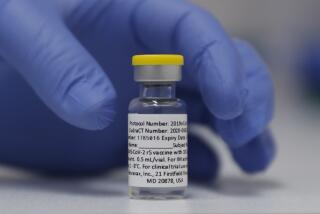A Dark Horse in the Race Against AIDS : With approval for human testing, an innovative 30-employee firm has taken the lead over giant competitors in the high-stakes scientific contest.
- Share via
WASHINGTON — At a major AIDS research conference here last month, Franklin Volvovitz trailed around researchers and reporters trying in vain to interest them in a one-page press release about his tiny biopharmaceutical company, MicroGeneSys.
“I tried to get us some attention, but I can’t say I made much headway,” said the 38-year-old founder, chairman and chief executive of the closely held company.
Volvovitz made a lot of headway Tuesday, however, when the U.S. Food and Drug Administration announced that West Haven, Conn.-based MicroGeneSys had become the first firm to win the agency’s clearance to test its experimental AIDS vaccine on humans. While MicroGeneSys (pronounced “microgenesis”) is still a long way from finding a way to prevent the disease, the 30-employee firm has taken an early lead over much larger competitors in a high-stakes scientific race.
“They’re first in, and that’s a feather in their cap,” said Richard Vietor, medical-products analyst at Merrill Lynch & Co. in New York.
And MicroGeneSys has won more attention than any chief executive could desire. Television camera crews Tuesday surrounded the company’s offices, housed in an unprepossessing converted warehouse, and filled its parking lot with their vehicles. MicroGeneSys employees, whose cars were hemmed in, complained that they couldn’t leave for lunch.
MicroGeneSys has more than a half-dozen competitors in the race to find an AIDS vaccine, including the Oncogen unit of Bristol-Meyers Co.; Chiron Inc., which is collaborating with Ciba-Geigy; the Houston-based Institute of Immunological Disorders, in collaboration with George Washington University; Repligen Corp., with Merck & Co., and others. Several may soon receive FDA approval to begin human clinical tests of their experimental vaccines.
Volvovitz doesn’t have advanced degrees either in science or business. He organized MicroGeneSys in 1984 after the failure of his first biotechnology company, a six-employee concern called BioTechnologies that was set up to produce and market interferon, an anti-viral agent, for laboratory and clinical use.
But the private investors who funded its operations had a change of heart after less than two years. “They made the decision to close it down and right away, bang, the assets were liquidated,” Volvovitz recalled.
Soon he had the idea for a new firm that would concentrate on an obscure area of biotechnology, the development of vaccines from baculoviruses, a family of viruses found in insects.
Many Collaborators
The company collaborates with about a dozen scientists from other research centers, including the Laboratory Centre for Disease Control in Canada and England’s National Institute for Medical Research. MicroGeneSys is using the same basic gene-splicing technology to search for vaccines to fight eight other diseases, including malaria, Volvovitz said.
Observers said MicroGeneSys’ prospects are helped by the strong support it seems to have won from its collaborators at the National Institute of Allergy and Infectious Diseases, which will carry out the initial tests of the vaccine. The organization’s director, Dr. Anthony S. Fauci, appeared with MicroGeneSys officials at a press briefing Tuesday and said the company’s genetically engineered vaccine “is an important first step” in the search for a way to prevent AIDS.
“The company that develops the vaccine is going to have to win friends in the government medical establishment, because this is a very political matter,” said James D. Mc Camant, editor of the Medical Technology Stock Letter in San Francisco. MicroGeneSys “seems to know how to do that,” he said.
Analysts said MicroGeneSys may have won that support in part by being more willing to share its proprietary products than other private firms have been.
Volvovitz declined to discuss how much money the company has at its disposal. He said MicroGeneSys has accepted no venture capital, but has raised cash entirely from a small number of individual private investors.
1994 Target Date
Many biotechnology firms have had public stock offerings, or been acquired by larger firms that could offer the financial resources needed to pay for lengthy drug-development efforts. Government researchers say they do not expect an AIDS vaccine to be ready for marketing until 1994.
But Volvovitz declined to disclose whether the company plans to go public or has other plans to gain financing.
One securities firm has estimated that an AIDS vaccine might serve a $1-billion market. Volvovitz demurred: “Wall Street firms seems to like big, round numbers, but nobody’s going to know for a long time how much money will be involved in this.”
Related Story, Part I, Page 14







